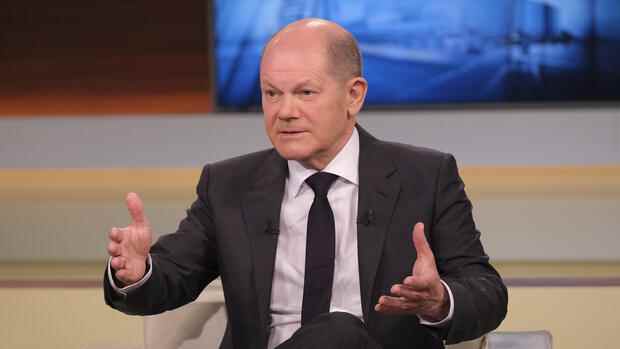The Chancellor accuses economists of acting “irresponsibly” with their calculations on the consequences of an energy embargo.
(Photo: dpa)
The relationship between the chancellery and the guild of economists has traditionally been a difficult one. During her 16 years in office, Angela Merkel repeatedly indicated that she often did not know what to do with the advice of economics. However, the public dislike that Olaf Scholz (SPD) showed to the economists during his TV appearance on Sunday evening is a new low.
The Chancellor was confronted with the question of why he continues to rely on Russian gas supplies despite the atrocities in Ukraine. Some economists consider an energy boycott to be manageable despite all of Germany’s dependencies. “They see it wrong,” said Scholz. And what’s more: it is “irresponsible” for these economists to add up such effects in “any mathematical models”.
Economics and members of the Leopoldina, the National Academy of Sciences, are among the economists that Scholz does not take seriously. Whatever one thinks of their proposals, Scholz’ tone towards them is inappropriate for a chancellor.
And Scholz has already made a mistake in the tone. During the election campaign, he, then still Federal Minister of Finance, lashed out against the scientific advisory board of the Federal Ministry of Economics, which had dared to point out possible medium-term holes in the pension fund and to demand an increase in the retirement age. Scholz spoke of a “so-called panel of experts” that “calculated incorrectly”.
Top jobs of the day
Find the best jobs now and
be notified by email.
Scholz’ verbal slap is a sign of insecurity
The contempt for scientists whose assessment one does not share was recently primarily the domain of Republican politicians in the USA. Scholz’s reflexes are similar: these theorists in their ivory towers have no idea of reality, that is the subtext of his statements.
Of course, economists’ models have their limitations. The calculations as to whether an energy boycott would really be so easy to cope with can be questioned – as chancellor you even have to. Scholz could point out that as the person responsible, he does not make such far-reaching decisions on such a basis. That would be the right answer for scientists who want to help find the best solution with their models.
However, the fact that Scholz verbally lashes out at those whose recommendations do not match his course is a sign of uncertainty. The chancellor feels that the terrible reports and images from Mariupol and other Ukrainian cities are making it more difficult to defend energy supplies from Russia. That’s why he reacts so thinly to scientific contradiction.
More: Energy embargo against Russia: Is Germany threatened with economic decline?
